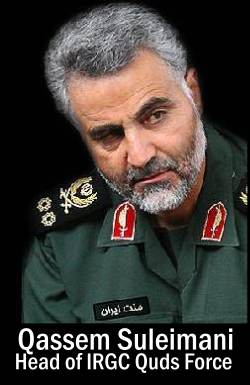|
2020-01-08 Syria-Lebanon-Iran
|
|
Soleimani’s death will put Iran’s proxy network to the test
|
[ENGLISH.ALARABIYA.NET] by Danielle Pletka
Qassem Soleimani
 was relatively obscure before his demise at the hands of a US drone last week. But as commander of the Quds Force, the outward facing arm of the Islamic Revolutionary Guard Corps, he was, more than anyone, the animating spirit behind the Islamic Republic’s hugely successful regional strategy to sow conflict across the Middle East. Soleimani epitomized the most successful aspect of Iran’s foreign policy – the development of proxy forces – and defined extremism long before al-Qaeda became a force to be reckoned with. The question now is whether his demise means the beginning of the end of the Iranian model of extremism he lead, or whether it can live beyond him. was relatively obscure before his demise at the hands of a US drone last week. But as commander of the Quds Force, the outward facing arm of the Islamic Revolutionary Guard Corps, he was, more than anyone, the animating spirit behind the Islamic Republic’s hugely successful regional strategy to sow conflict across the Middle East. Soleimani epitomized the most successful aspect of Iran’s foreign policy – the development of proxy forces – and defined extremism long before al-Qaeda became a force to be reckoned with. The question now is whether his demise means the beginning of the end of the Iranian model of extremism he lead, or whether it can live beyond him.
Since September 11, 2001, the Western press has been far more concerned with the extremism embraced by al-Qaeda and affiliates, as well as offshoots like ISIS and al-Shabab. But the essence of terrorism and the use of asymmetrical proxy forces today stems from Iran and the system that Soleimani perfected. From Lebanese Hezbollah to the Palestinian militant group Hamas and Palestinian Islamic Jihad, from the Hezbollah al-Hejaz to the Houthi militia, from Iraq’s Popular Mobilization Units militias to other, less well-known groups in Iraq, Iran’s Quds Force mastered the strategy of establishing terrorist proxy movements.
Each group has its own purpose, but ultimately answers to Tehran. Each group has genuine roots in its own nation and champions popular concerns. But their leadership is funded, commanded and ultimately decided by Iran. Each group has enabled the Islamic Republic to shape the conflicts in Syria, Yemen, Iraq and Lebanon, and yet enjoys a façade of deniability that has frustrated efforts to blame Iran directly.
The deaths that can be laid at Soleimani’s feet are legion. Hundreds, if not thousands, of US troops fighting in Iraq. Hundreds of thousands of Syrians. Scores of Lebanese, Israelis, Iraqis, Syrians, Yemenis, Saudis and so many more would be alive today had he not been in command. But Soleimani had help – and not just from the leadership in Tehran or the useful pawns who lead Hezbollah, the Houthis, and others. No, Soleimani’s most useful dupes were in Europe and the United States.
For every attack Soleimani ordered no matter what the territory, there were those willing to question Iran’s responsibility. To be fair, the groundwork was laid before he took over the Quds Force in the mid to late 1990s. But Soleimani took the reins and built on the tradition that saw the assassination of Supreme Leader Khomeini’s enemies in Europe after the revolution; the 1983 Marine barracks bombing in Beirut; the attack on the Jewish Community Center in Buenos Aires in 1994; and the Khobar Towers bombing in 1996. Yet the number of governments willing to lay the blame directly at Iran’s feet is short.
Now that Soleimani is gone, will his successor enjoy the same success in grooming proxies and destabilizing the Middle East? Iran’s model has worked so well, it’s easy to imagine almost anyone keeping it going. But the truth is that Soleimani’s minions have been having a rough time in recent months. Hezbollah had to pressgang Lebanese Shia into fighting for Syria’s President Bashar al-Assad in Syria. And Iran ended up dragging in a motley crew of Shia militants from Pakistan, Afghanistan and elsewhere to help.

Demonstrators in Beirut have challenged the pro-Iran politicians there, and took on Hezbollah thugs who tried to oppose demonstrators. Similarly in Iraq, demonstrators outraged by corruption and government incompetence took to the streets only to find themselves up against Iranian-controlled militias. In each case, the government ultimately fell notwithstanding the opposition of Iranian-backed terror groups, notwithstanding the loss of life Iran was willing to inflict in order to protect its friends.
The truth is that over decades, Iran’s greatest asset has been the willingness of supine regional governments and quiescent foreigners to go along with its game. It is possible – not more than possible – that this game is coming to an end. Soleimani was not the be-all and end-all of Iranian foreign policy; but he wasn’t a nobody either. A credible and capable commander, with determination and imagination, and a fixed malign agenda can do a great deal of damage. And he is not easily replaced once dead.
Perhaps Washington, London, Paris and Berlin will gain some courage from his passing. And perhaps with them, Baghdad and Beirut and others will too. The secret to defeating the Iranian terror machine begins with a decision to no longer tolerate it. Let’s see how long that resolve lasts.

|
Posted by Fred 2020-01-08 00:00||
||
Front Page|| [11134 views ]
Top
File under: Govt of Iran
|
|
14:48 NoMoreBS
14:31 NoMoreBS
14:16 NoMoreBS
14:15 NoMoreBS
14:04 swksvolFF
13:47 Regular joe
13:43 swksvolFF
13:38 swksvolFF
13:34 swksvolFF
13:31 Abu Uluque
13:25 Heribertus Vedente
13:24 mossomo
13:20 Abu Uluque
13:14 mossomo
13:06 swksvolFF
12:51 Grom the Affective
12:31 Abu Uluque
12:20 swksvolFF
12:17 Abu Uluque
12:08 swksvolFF
12:08 ed in texas
12:05 ed in texas
12:01 ed in texas
12:00 ed in texas









|












